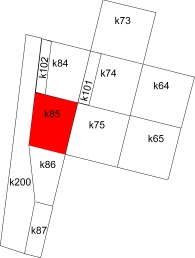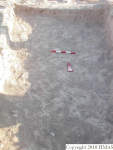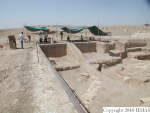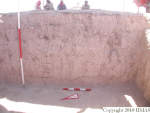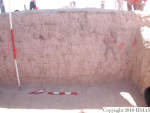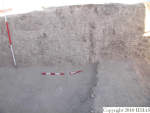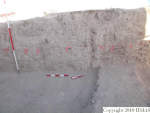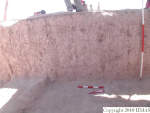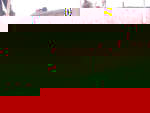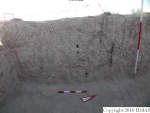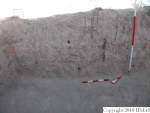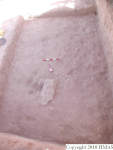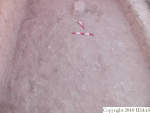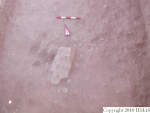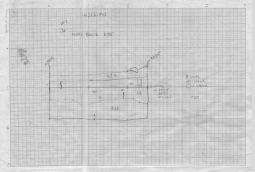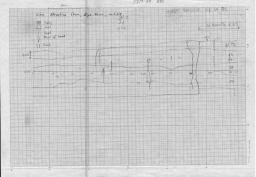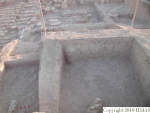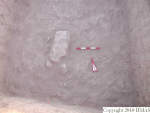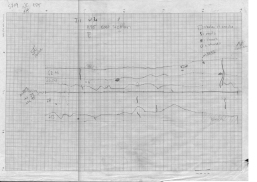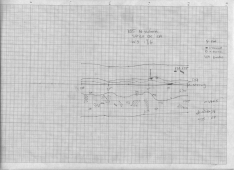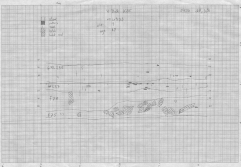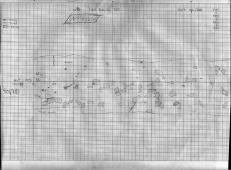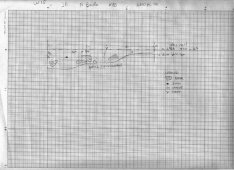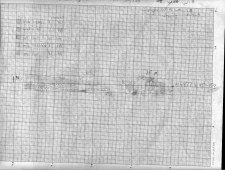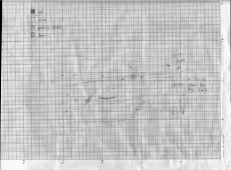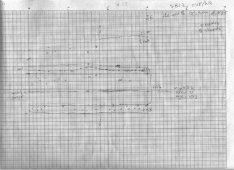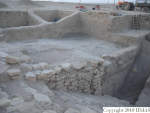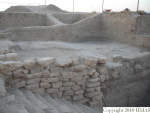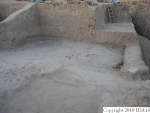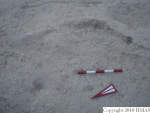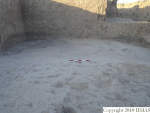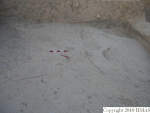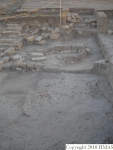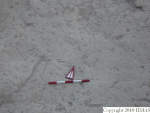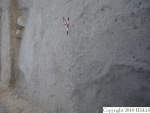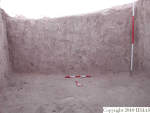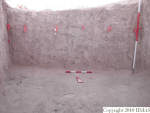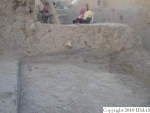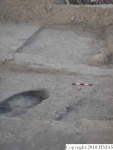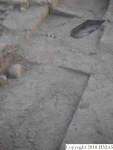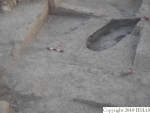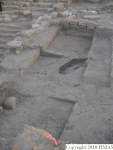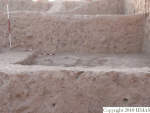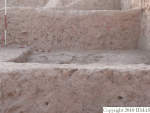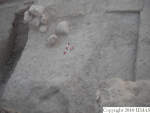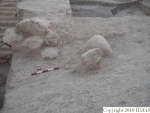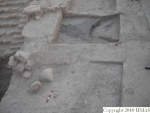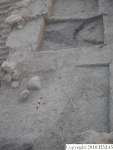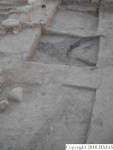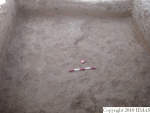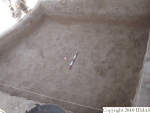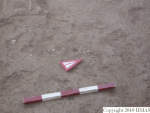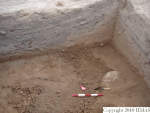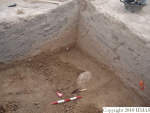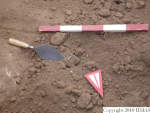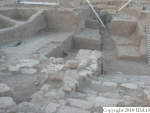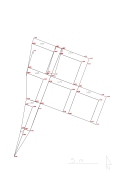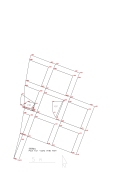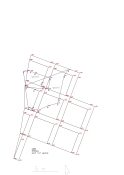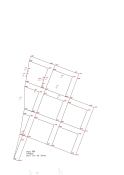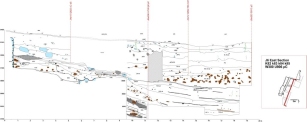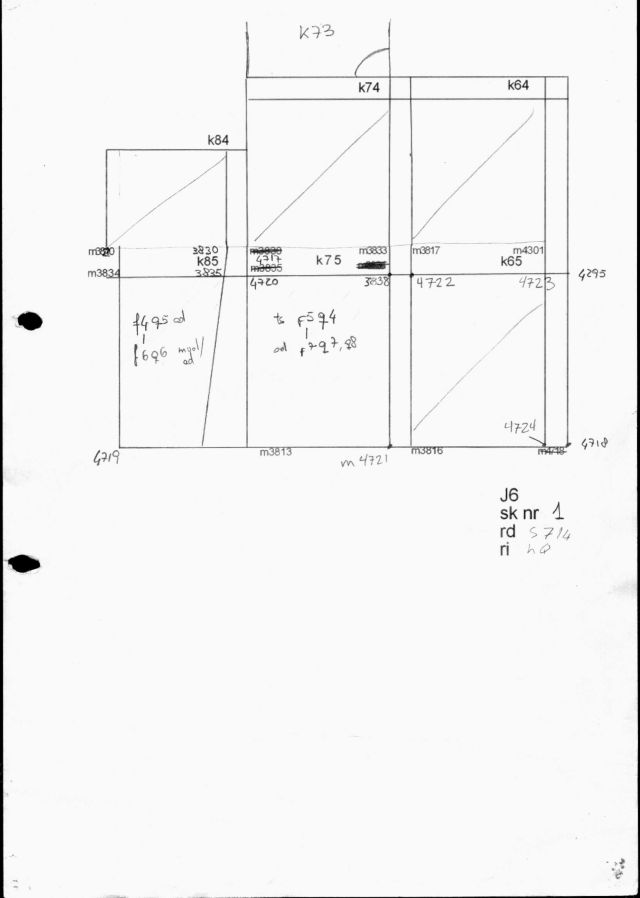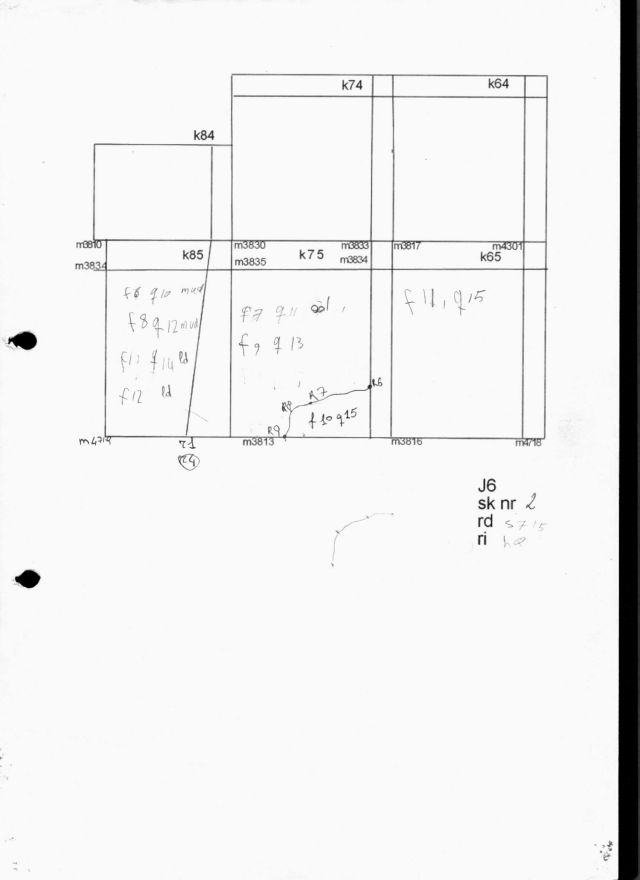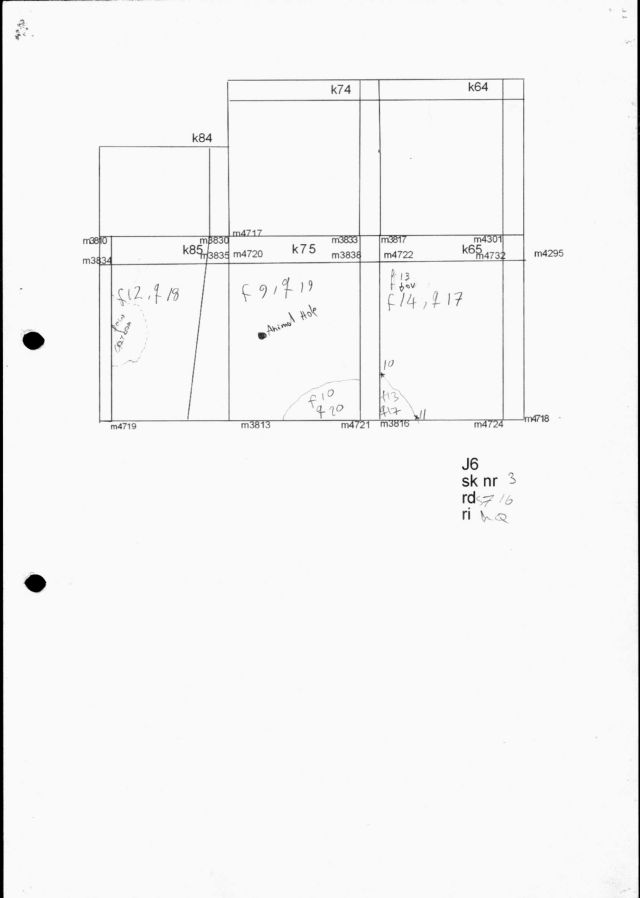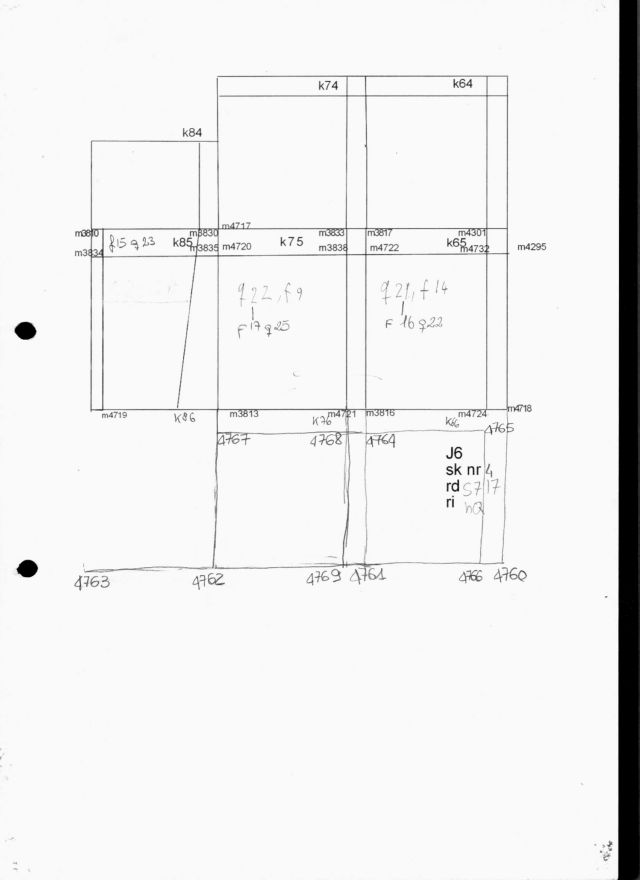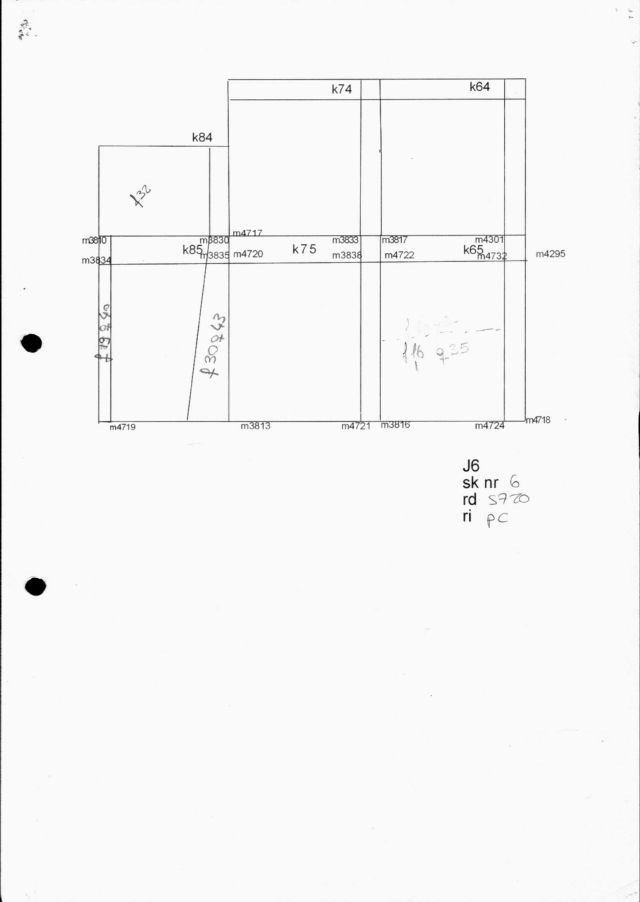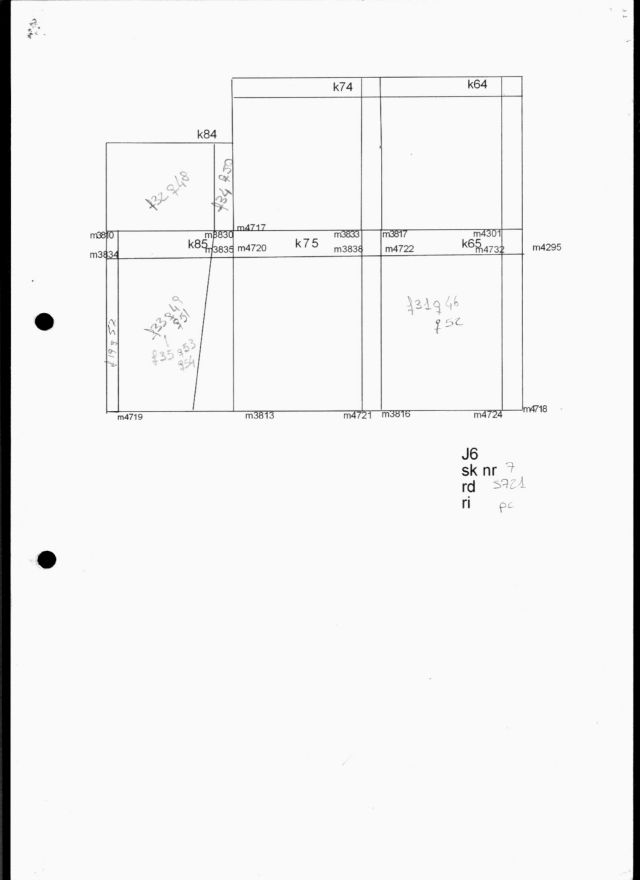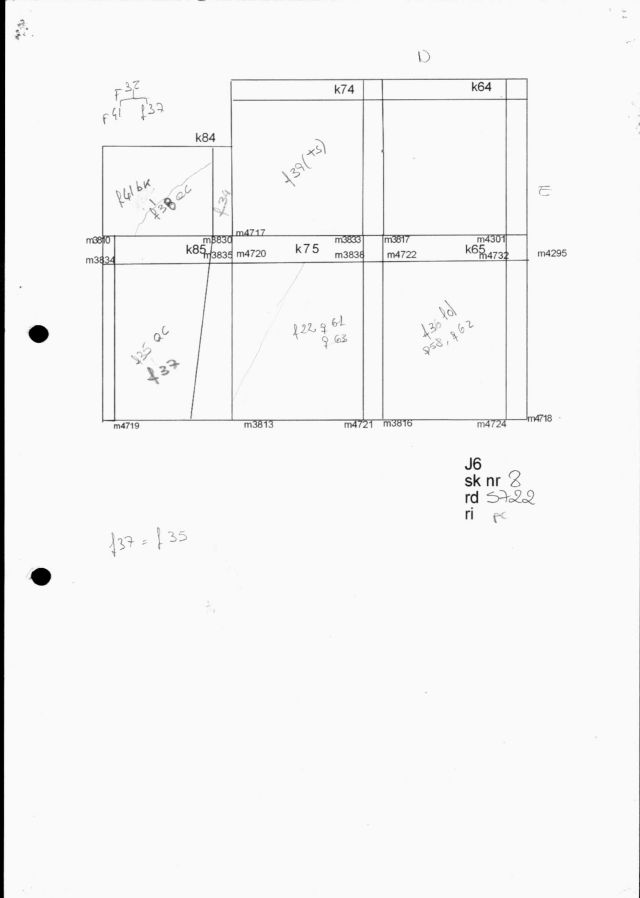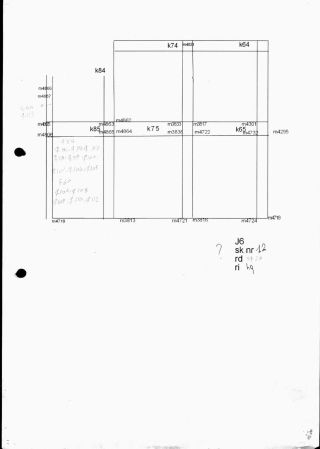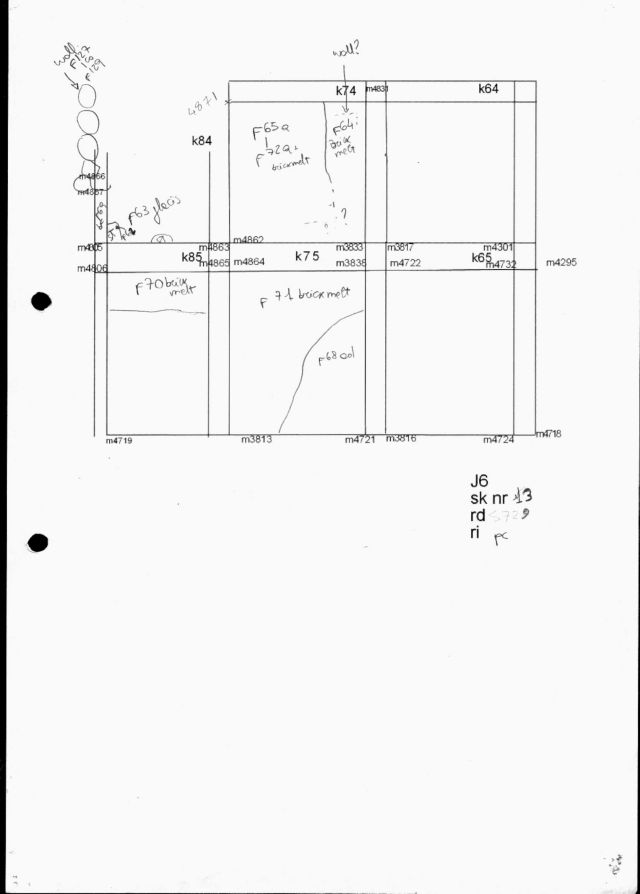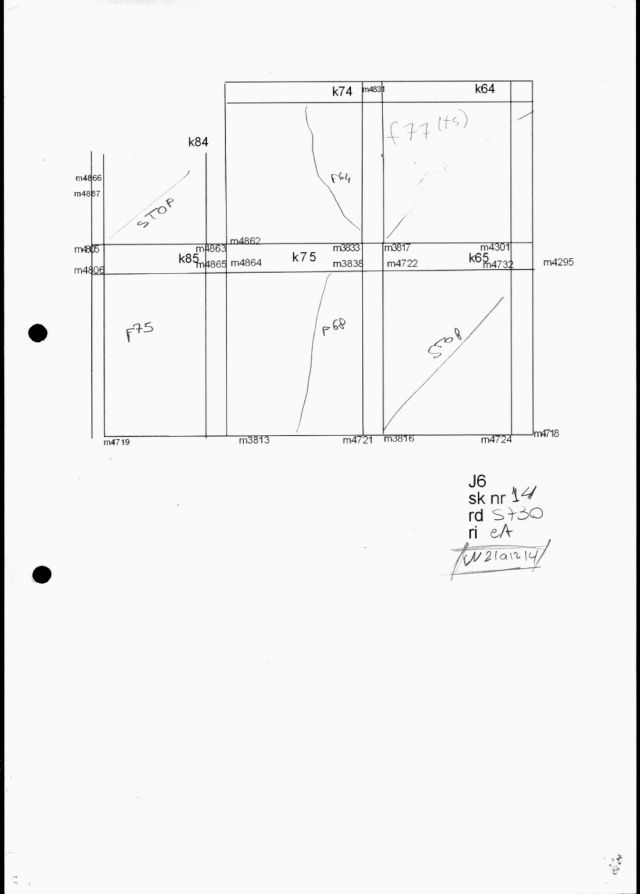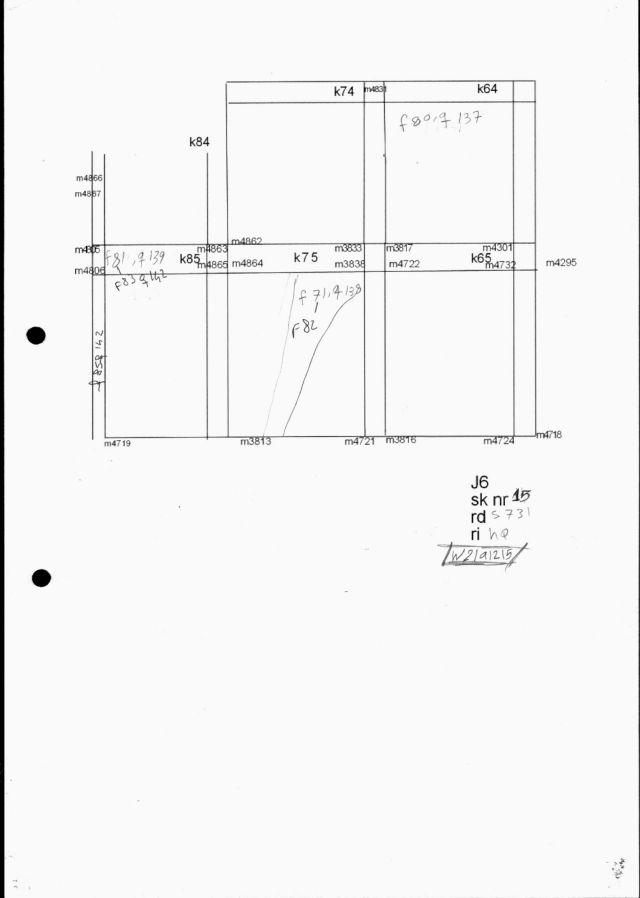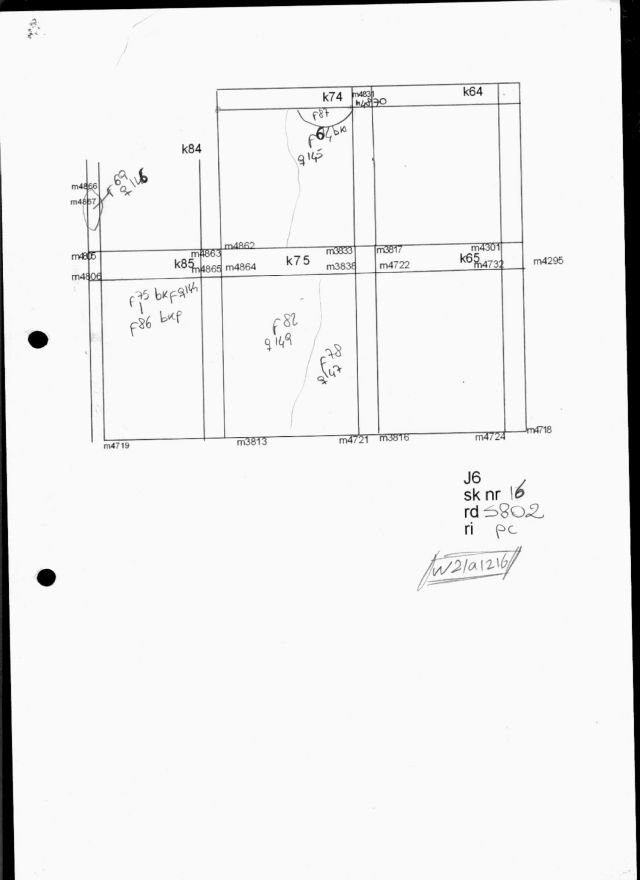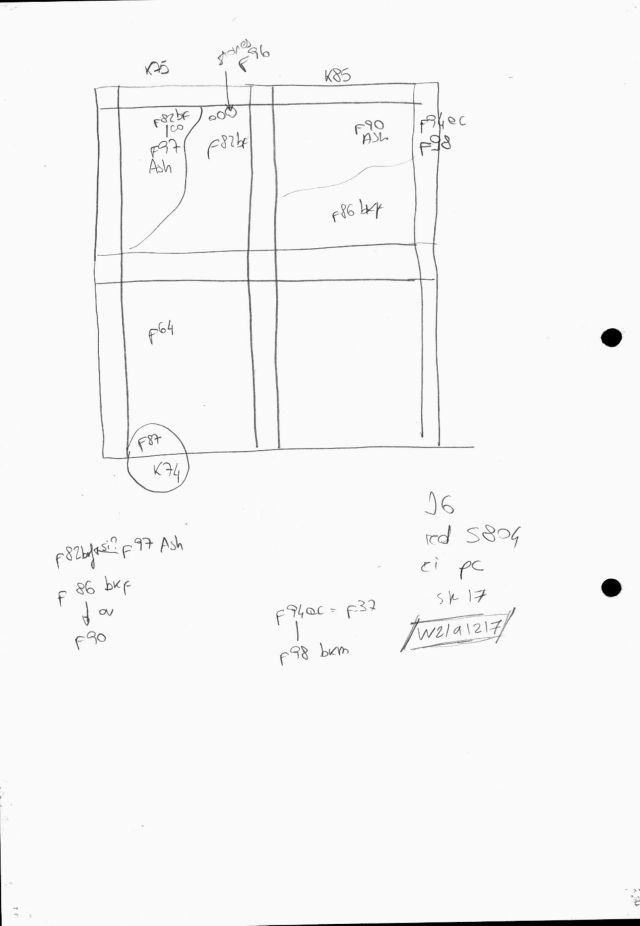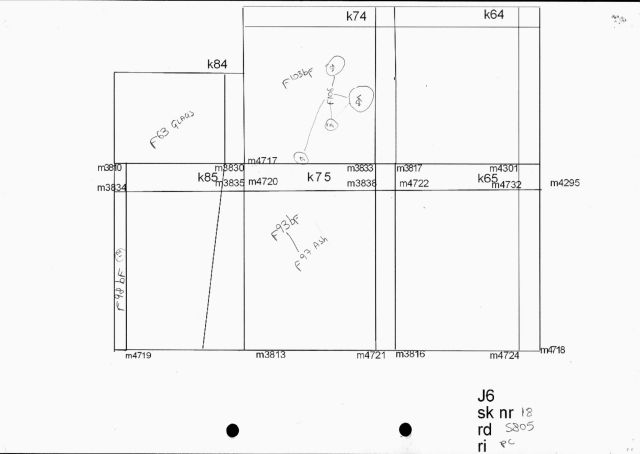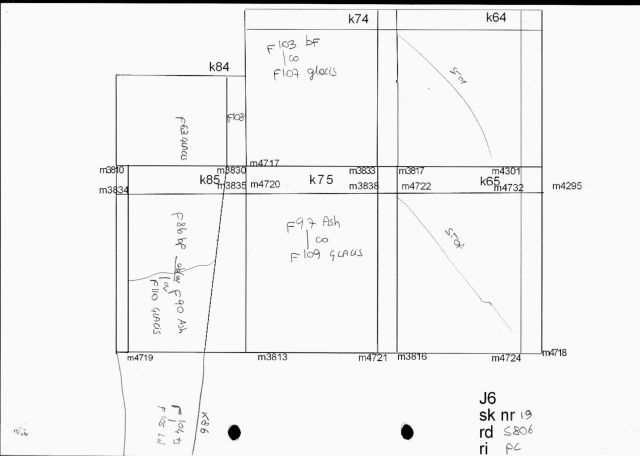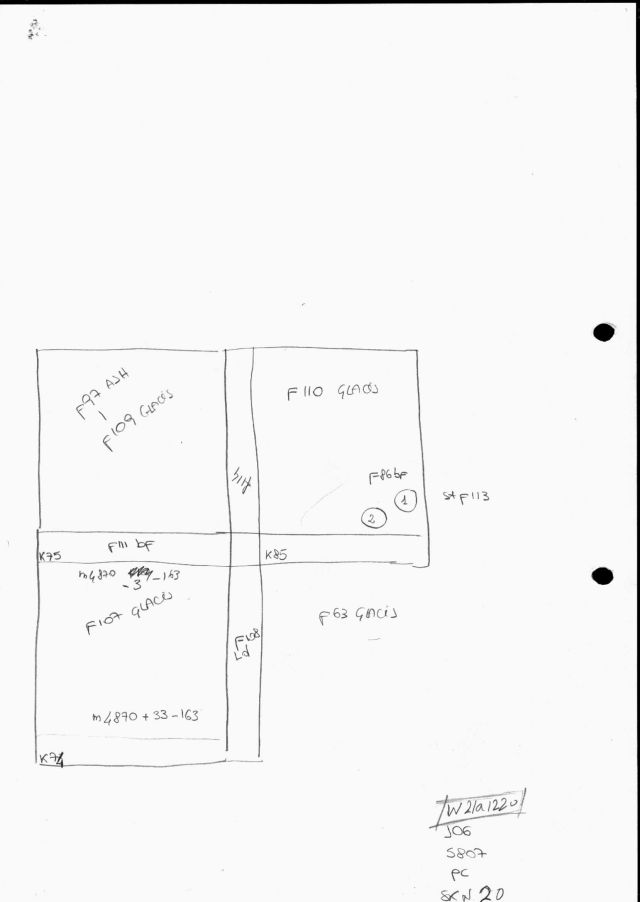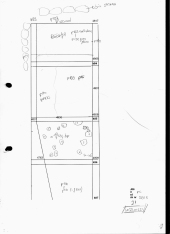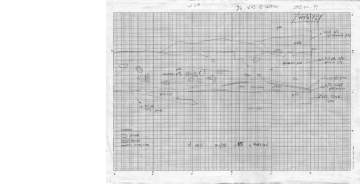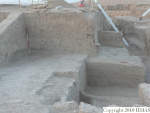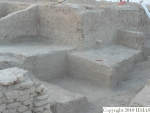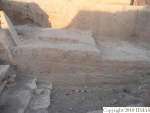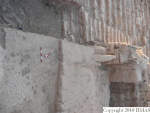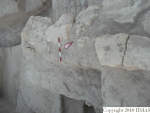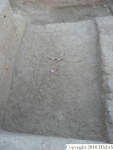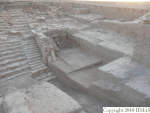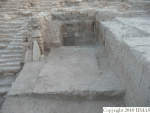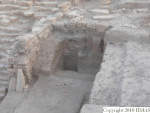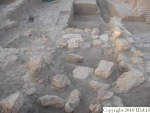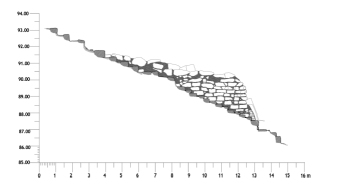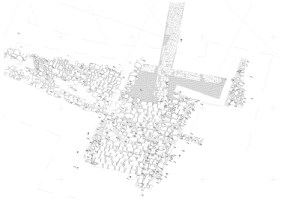2. IDENTIFICATION
Designation
| Roster | Date | Author | Record |
|---|---|---|---|
| Description (summary) | 2008-07-13 | pC | k85 is defined by the markers m3813, m3836, m3834, m4719, m3835, m4717, m3830, m3820. k85 is a trapezoidal locus located East of k200. The trench k200 was excavated before and does not follow the excavation grid, being excavated from another team (see k200 for further information) [Input: S707PC.J] |
3. STRATIGRAPHY
Recovery/Assignment
| Roster | Date | Author | Record |
|---|---|---|---|
| Daily notes about recovery of elements | 2008-07-13 | pC | we begin to excavate the top soil which is f2. Then we change number in f3 for the natural accumulation under the top soil, which is 30 cm thick. It is a natural accumulation crumby and soft in texture. It has dark organic bands and roots. The pottery collected has been looked and thrown away, being the first 40 cm. [Input: S707PC.J] |
| 2008-07-14 | pC | k85 was relayed because it is not a regualr locus but is trapezoidal. Today we excavated f4, which is a natural accumulation with stones >10cm, few pottery sherds. It is soft when picked and fine in texture; in the southern area is more hard and aKarim exposed a part of it. We took the elevation and we decided to change feature number, since the surface expands in all the locus. The new feature is f6, which at the top elevation I defined mud: this surface is irregular and has few pottery sherds and some stones (>5cm). This surface has been photographed (v6 and v6a) and relayed (4 points in the limits of the feature, which corrisponds to the limit of k85: r2, r3, r4, r5). The difference between the feature above, f4, can be seen in section, where f4 is more soft, instead f6 is more compact, fine in texture and clean from pottery sherds. This feature at different levels is characterized by more compact surface, due to the exposure to water. hQ has been looked to the sherds in k85 and her first impression is that there is no interesting sherd, instead in k74 there are more interesting sherds. [Input: S714PC.J] | |
| 2008-07-15 | pC | Today we continue excavating in k85 and in k75. We keep f6 because is still the same accumulation. Then i decided to change the feature number, not because we see a change in the feature, but because we went down for at least 40 cm with the same feature. f8 is very similar to f6, but is darker in color and is more wet. It is characterized by the presence of patches of harder and softer soil, due to the exposure to water. We changed feature in f12, which is the same clay, fine in texture, but has a platy structure when picked. aKarim exposed a small area with the small pick: this feature has a lot of phytoliths and some ashes. This was probably exposed to water and was compacted naturally. Tomorrow we will expose more this area but I don' t give too much importance, because it seems natural: the clay is very clean and with few pottery sherds. [Input: S714PC.J] | |
| 2008-07-16 | pc | Today we keept all the day f12, which is always the same clay, very fine in texture and very soft. It has still very few pottery or stones. The soil comes out in chunks when picked and leaves color on fingers. In the Western area there are some small carbons, and there are still roots. gB observed this feature and finds it very interesting because of the texture and that is so soft. In k85 we expect to find a brick fall at the elevation of 90.00@ or even higher. At the end of the day we cleaned all because we reached the elevation of k84. eA and cJC draw the North section and then Diadin photographed it. Tomorrow we will take down the North section. [Input: S716PC.J] | |
| 2008-07-17 | pC | Today in k85 was removed the North baulk: it is f15 but it includes all features in k85 (f2, f3, f4, f6, f8, f12) [Input: S718PC.J] | |
| 2008-07-19 | pc | Today cJC and dH draw the West section of k85, because we want to remove the baulk. Afterwards we took the view of the section. In k85 we stop excavating, while we remove all the baulk. [Input: S719PC.J] | |
| 2008-07-20 | pC | All the day was removed the West baulk f19: it has all features of k85 and in the Southern part is larger than 1 meter. [Input: S720PC.J] | |
| 2008-07-21 | pC | Today aKarim and Táer finished to remove the West baulk f19. Then he removed f33, which was still very soft when picked and fine in texture, very dusty when removed. They exposed a nice surface of compacted soil with some patches of softer soil: this surface had some sherds liyng flat, some pebbles, ashes and brick crumbles. I decided to expose all and to make a picture, which is v19: a big smooth and flat stone came out under f33. The new feature is f35 and has a lot of pottery and is soft and dusty when removed: there is no clear interface between f33 and f35: the difference is that f35 has more pottery and pebbles and is more reddish. [Input: S721PC.J] | |
| 2008-07-22 | pC | Today we excacated only few cm, because we found a level with a lot of pebbles under f35, which had also lot of pottery and some pebbles. f37 presents a hard surface, with a lot of pebbles, sherds and some animal bones. This is also characterized by the presence of brick crumbles, baked bricks and melted bricks. There are also some ashes. In the South part of the square there is a big stone f40. [Input: S722PC.J] | |
| 2008-07-23 | pC | today we removed the eastern baulk of k85 which is f30 q73: it was left only half of it because was created a ramp for the wheelbarrow. [Input: S723PC.J] | |
| 2008-07-26 | pC | today we cleaned the surface of f37, since was exposed for few days. [Input: S725PC.J] | |
| 2008-07-28 | pc | Today we removed f37, which was exposed since last week, but we decided to leave it since we removed all baulks. In one pickrun were collected 7 bags of pottery in f37, which is Mittani (mKB). f37 was also full of bones, brick crumbles and pebbles. We found several pieces of ancient cement q105.1 in f37. We removed the stone f40 which was resting on top of f37. Probably f37 is a dump coming from the structures in k75, k74, which we are exposing today. f37 covered f60, which is a soft accumulation full of pottery and pieces of gypsum: f60 covered a surface of melted bricks, that today we did not excavated and tomorrow we will give a new feature number. [Input: S728PC.J] | |
| 2008-07-29 | hQ | we started digging f70 which was not covering the whole locus. Part of the western part of k85 is f60. f70 is divided into 3 parts, the nothern part consists of completed bricks. The eastern part of f70 is divided also into the southern part which is very compact but flat and smooth (probably because of the stone f40 which we removed); and the nothern part is a brick melt. [Input: S729CJC.J] | |
| 2008-07-29 | pc | Today we continued to excavate f60, which is an accumulation with some brick melt and is soft when picked. It abuts and covers f70, which is the brickmelt located in the northern and eastern part of the square. We decided to remove the first 10 cm of the brickmelt f70 to see if there is a clear brickfall or structure under it, but in the East part disappeared and continued in the northern. We removed also the northern part and under seems to be a mixture of f60 and f70. This is probably due to the fact that the brickmelt mixes up with other accumulation. Therfore all k85 at the end of the day was uniform of red melted bricks and patches of softer soil. In the southern part of the square there is a complete grind stone, probably still in situ. [Input: S729PC.J] | |
| 2008-07-30 | pc | today we removed only f75, which is the brickfall same as f53 in k84. [Input: S730PC.J] | |
| 2008-07-31 | pc | today we removed the North baulk: i decided toexcavate it in different features, following the stratigraphy we encontered in k85: the first 40 cm are accumulations f81, then there is the brickmelt and brickfall f83. We tried to find f37, the dump with a lot of pebbles and sherds, but we did not find it, therefore i decided to excavate it as brickfall, being all the feature brickmelt and brickfall, same as f75 and f53 f52. [Input: S731PC.J] | |
| 2008-08-02 | pC | Today we removed the upper part of the western baulk f85, which is soft. We decided still to keep the remaing part of the baulk because shows nicely the brickfall. We excavated the brickfall f75 and f86. f75 is the same of f53 and f86 is the same as f55, which covers the glacis f63. At the end of the day we uncovered some large stones. [Input: S802PC.J] | |
| 2008-08-03 | pC | Today we excavated f86, which is the brickfall: it is a soft brown wet soil with big chunks of red and grey bricks whith some carbons and stones. there are some stones f91 sitting in f86: they are 5 stones of >50cm located in a line South-West East-North. Because they sit in the brickfall they come probably from the presumed structure which created the brickfall; we also found two door socket in f86 q153.2. In the Southern part of k85 there is a lens of ash f86, which sits in the brickfall f89. This is characterized by the presence of carbons, brick cumples and vegetal inclusions: we made a sample of this q153.1 [Input: S803PC.J] | |
| 2008-08-04 | pC | Today we begin to remove the western baulk: the topmost feature is f94, which is an accumulation full of pottery and pebbles and some stones, same as f37; after removing it we changed feature in f98, which is the brickmelt f70: it is harder and compact. Today we had a camera taking views every 50 cm of the removing of the baulk. This will allow us to see the sequence of the removing and the discovery of the glacis f63 and the wall f130. We also removed part of f90, which is an ashy accumulation under the brickfall. We started to remove it because we thougt that was a lens inside the brickfall, but the East section of k200 shows clearly the relationship between the brickfall and f90, which overlays it [Input: S804PC.J] | |
| 2008-08-05 | pC | Today we finished to remove the west baulk f98, which is the brickfall same as f86. We found i3, which is a small arryballos probably to keep some kind of oil or parfums. dM took 2 views of the removing of the baulk v48. [Input: S805PC.J] | |
| 2008-08-06 | pC | Today we removed all the brickfall f86 and the ash f90. They cover the glacis f110, but the brickfall overlays the ash. f90 is the same as f97 in k75 and the ash is visible in the East section of k200, where is located under the brickfall. [Input: S806PC.J] | |
| 2008-08-09 | pc | today we finished to remove the East section f114, which is brickfall [Input: S809PC.J] | |
| 2008-08-14 | pC | Today we started to remove the glacis f110 and we found under it a floor surface characterized by sherds lying flat and some small pebbles [Input: S815PC.J] | |
| 2008-08-17 | cVP | the only operation that has been done in this square today has been the drawing of the West section, in order to be able to excavate the western Baulk tomorrow [Input: S817CVP.J] | |
| 2008-08-18 | cVP | Today we remove the E baulk [Input: S817CVP.J] | |
| 2008-08-18 | pC | today we removed the west baulk f145 which is in The upper and northern half brickfall same as f86, in the Southern and lower part is the ashy layer same as f90. It was decided to remove it all as one feature, since the ash was mixed to the brickfall in the middle and was difficolt to distinguish them [Input: S818PC.J] | |
| 2008-08-19 | pC | Today we started in k85: we removed the floor f135 and then the glacis which is located in the western part of the square (f110). Then in all the locus was found a soft brown accumulation with few pottery f148 [Input: S819PC.J] | |
| 2008-08-20 | pC | Today we excatated in all the square f148, same feature as yesterday: it is a brown soft accumulation, wet and with lot of organic material, bones and few pottery. Under it we found a surface compacted naturally, where some sherds were lying flat and some small pebbles were on the surface. We called it floor but excavating it was the same accumulation as f148, only was more compact. [Input: S820PC.J] | |
| 2008-08-25 | pC | removed the west baulk f161 which consists in natural accumulations (f148, f154, f158) [Input: S826PC.J] | |
| 2008-08-26 | pC | we removed the north baulk in all one feature f168, which consists in natural accumulations. This baulk was very important because the layers are flat in opposition to the northern portion of k84 were the layers are at 45° slope (see f164). This section marks the beginning of the change in the stratigraphy and therefore we took several pictures of it showing the difference with the West baulk of k84 and J4k100. [Input: S826PC.J] |
Volumetric Localization
| Roster | Date | Author | Record |
|---|---|---|---|
| Elements within locus | 2008-07-13 | cJC | f2 (topsoil) [Input: S713CJC.J] |
| 2008-07-13 | hQ | f3 (accumulation D) [Input: S714CJC.J] | |
| 2008-07-14 | hQ | f4 (accumulation D) f6 (accumulation D) [Input: S715CJC.J] |
|
| 2008-07-15 | hQ | f8 (lens type d) [Input: S715CJC.J] | |
| 2008-07-15 | cJC | f12 (lens type d) [Input: S716CJC.J] | |
| 2008-07-16 | cJC | f15 (mix feature) [Input: S718PC.J] | |
| 2008-07-19 | cJC | f19 (mix feature) [Input: S719CJC.J] | |
| 2008-07-20 | dH | f30 (mix feature) [Input: S720CJC.J] | |
| 2007-07-21 | pC | f33 (lens type d) [Input: S721PC2.J] | |
| 2007-07-21 | hQ | f35 (accumulation A) [Input: S721PC2.J] | |
| 2008-07-22 | pC | f37 (accumulation C) [Input: S722PC.J] | |
| 2008-07-22 | hQ | f40 (isolated stone) [Input: S722PC.J] | |
| 2008-07-23 | pC | f49 (dump) [Input: S723PC.J] | |
| 2008-07-29 | hQ | f60 (lens type d) f70 (layer) [Input: S729CJC.J] |
|
| 2008-07-29 | pc | f74 (layer) [Input: S729PC.J] | |
| 2008-07-30 | hQ | f75 (brickfall) [Input: S730CJC.J] | |
| 2008-07-31 | hQ | f81 (lens type d) f83 (brickfall) [Input: S803EA.J] |
|
| 2008-07-31 | pC | f85 (mix feature) [Input: S803EA.J] | |
| 2008-08-02 | hQ | f86 (brickfall) [Input: S803EA.J] | |
| 2008-08-03 | hQ | f90 (lens) [Input: S803EA.J] | |
| 2008-08-03 | pC | f91 (isolated stone) [Input: S803EA.J] | |
| 2008-08-04 | cJC | f95 (accumulation C) f98 (brickfall) [Input: S804CJC.J] |
|
| 2008-08-04 | pC | f102 (isolated stone) [Input: S804PC.J] | |
| 2008-08-06 | pC | f110 (glacis) [Input: S809CJC2.J] | |
| 2008-08-07 | pC | f113 (isolated stone) f114 (lens type d) [Input: S809CJC2.J] |
|
| 2008-08-11 | pC | f118 (glacis) [Input: S811PC.J] | |
| 2008-08-10 | cJC | f120 (brickfall) [Input: S813CJC.J] | |
| 2008-08-14 | pc | f135 (pavement, type c) [Input: S816PC.J] | |
| 2008-08-18 | pC | f145 (brickfall) [Input: S818PC.J] | |
| 2008-08-19 | pC | f148 (accumulation D) f152 (wall) [Input: S824CVP1.J] |
|
| 2008-08-20 | pC | f154 (floor, type b) [Input: S824CVP1.J] | |
| 2008-08-20 | hQ | f158 (accumulation B) [Input: S824CVP1.J] | |
| 2008-08-20 | pC | f161 (lens type d) [Input: S824CVP1.J] | |
| 2008-08-27 | pC | f168 (lens type d) [Input: S826PC.J] | |
| 2009-07-21 | yM | f189 (accumulation D) [Input: T727YM.J] | |
| 2010-02-15 | pC | f195 (mix feature) [Input: U125PC.J] | |
| 2008-08-07 | cJC | i3 (ceramic vessel) i5 (sample) i5.1 [Input: S818PC.J] |
|
| 2008-08-27 | dH | i14 (metal artifact) [Input: S828CVP.J] | |
| 2008-07-13 | hQ | q2 (pottery) q3 (pottery) [Input: S713CJC.J] |
|
| 2008-07-14 | cJC | q5 (pottery) q6 (pottery) [Input: S714CJC.J] |
|
| 2008-07-14 | eA | q9 (pottery) [Input: S714CJC.J] | |
| 2008-07-15 | hQ | q10 (pottery) [Input: S715CJC.J] | |
| 2008-07-15 | cJC | q12 (bones, pottery) q14 (pottery) q16 (pottery) [Input: S715CJC.J] |
|
| 2008-07-16 | cJC | q18 (pottery) [Input: S716CJC.J] | |
| 2008-07-17 | cJC | q23 (pottery) [Input: S718PC.J] | |
| 2008-07-19 | cJC | q30 (pottery) [Input: S719CJC.J] | |
| 2008-07-20 | hQ | q40 (pottery) [Input: S720CJC.J] | |
| 2008-07-20 | dH | q43 (bones, pottery) [Input: S720CJC.J] | |
| 2008-07-21 | pC | q47 (pottery) q49 (bones, pottery) [Input: S721PC2.J] |
|
| 2008-07-21 | hQ | q51 (pottery) [Input: S721PC2.J] | |
| 2008-07-21 | pC | q53 (bones, pottery) q54 (bones, pottery) q55 (bones, pottery) [Input: S721PC2.J] |
|
| 2008-07-22 | hQ | q56 (pottery) [Input: S723EA.J] | |
| 2008-07-23 | hQ | q73 (pottery) [Input: S723EA.J] | |
| 2008-07-26 | hQ | q90 (pottery) [Input: S727CJC.J] | |
| 2008-07-28 | eA | q92 (bones, pottery) q95 (pottery) q96 (pottery) q97 (pottery) q98 (pottery) q99 (pottery) q100 (pottery) q101 (pottery) q104 (pottery) q105 (pottery) [Input: S728HQ.J] |
|
| 2008-07-28 | hQ | q106 (pottery) [Input: S728HQ.J] | |
| 2008-07-28 | eA | q108 (pottery) q109 (bones, pottery) q110 (pottery) q112 (bones, pottery) q115 (pottery) [Input: S728HQ.J] |
|
| 2008-07-29 | eA | q122 (pottery) [Input: S729CJC.J] | |
| 2008-07-29 | hQ | q128 (bones, pottery) [Input: S729CJC.J] | |
| 2008-07-30 | eA | q133 (bones, pottery) [Input: S730CJC.J] | |
| 2008-07-31 | pC | q139 (bones, pottery) [Input: S803EA.J] | |
| 2008-07-31 | hQ | q141 (bones, pottery) q142 (pottery) [Input: S803EA.J] |
|
| 2008-08-02 | eA | q144 (pottery) [Input: S803EA.J] | |
| 2008-08-02 | hQ | q148 (bones, pottery) [Input: S803EA.J] | |
| 2008-08-03 | eA | q153 (bones, pottery) [Input: S804CJC.J] | |
| 2008-08-03 | hQ | q156 (pottery) [Input: S804CJC.J] | |
| 2008-08-04 | eA | q159 (bones, pottery) q162 (bones, pottery) [Input: S804CJC.J] |
|
| 2008-08-04 | cJC | q163 (bones, pottery) q165 (bones, pottery) q166 (bones, pottery) q167 (bones, pottery) [Input: S804CJC.J] |
|
| 2008-08-04 | hQ | q168 (pottery) [Input: S804CJC.J] | |
| 2008-08-05 | hQ | q169 (bones, pottery) [Input: S805CJC.J] | |
| 2008-08-05 | cJC | q173 (pottery) [Input: S805CJC.J] | |
| 2008-08-05 | eA | q175 (pottery) [Input: S805CJC.J] | |
| 2008-08-06 | eA | q177 (bones, pottery) [Input: S806CJC.J] | |
| 2008-08-06 | hQ | q181 (pottery) [Input: S806CJC.J] | |
| 2008-08-07 | pC | q185 (bones, pottery) q187 (pottery) [Input: S809CJC2.J] |
|
| 2008-08-09 | eA | q190 (bones, pottery) [Input: S809CJC2.J] | |
| 2008-08-10 | cJC | q199 (pottery) [Input: S813CJC.J] | |
| 2008-08-14 | eA | q205 (bones, pottery) [Input: S816PC.J] | |
| 2008-08-16 | cJC | q218 (bones, pottery) [Input: S816PC.J] | |
| 2008-08-18 | pC | q234 (bones, pottery) [Input: S818PC.J] | |
| 2008-08-19 | eA | q243 (bones, pottery) q246 (pottery) [Input: S826PC.J] |
|
| 2008-08-19 | pC | q247 (pottery) q248 (pottery) [Input: S826PC.J] |
|
| 2008-08-19 | eA | q251 (bones, pottery) [Input: S831HQ.J] | |
| 2008-08-20 | eA | q254 (pottery) [Input: S831HQ.J] | |
| 2008-08-20 | pC | q259 (pottery) [Input: S831HQ.J] | |
| 2008-08-21 | pC | q261 (pottery) [Input: S831HQ.J] | |
| 2008-08-23 | eA | q262 (bones, pottery) [Input: S824CVP1.J] | |
| 2008-08-23 | hQ | q267 (pottery) [Input: S824CVP1.J] | |
| 2008-08-24 | pC | q270 (bones, pottery) [Input: S826PC.J] | |
| 2008-08-26 | eA | q275 (bones, pottery) [Input: S902HQ.J] | |
| 2008-08-27 | hQ | q285 (pottery) [Input: S902HQ.J] | |
| Relays (applicable to elements) | 2008-07-14 | cJC | r2 (38255 51385 - 9209 / Relay location: k85) [Input: S714CJCR.J] |
| 2008-07-14 | cJC | r3 (38642 51397 - 9227 / Relay location: k85) [Input: S714CJCR.J] | |
| 2008-07-14 | cJC | r4 (38572 51603 - 9222 / Relay location: k85) [Input: S714CJCR.J] | |
| 2008-07-14 | cJC | r5 (38210 51547 - 9219 / Relay location: k85) [Input: S714CJCR.J] | |
| Extension of locus or q-lot | 2008-07-13 | pC | m3813 [Input: S716CJC.J] |
| Length of two sides | 2008-07-13 | pC | 270W [Input: S716CJC.J] |
| 2008-07-13 | pC | 400N [Input: S716CJC.J] |
